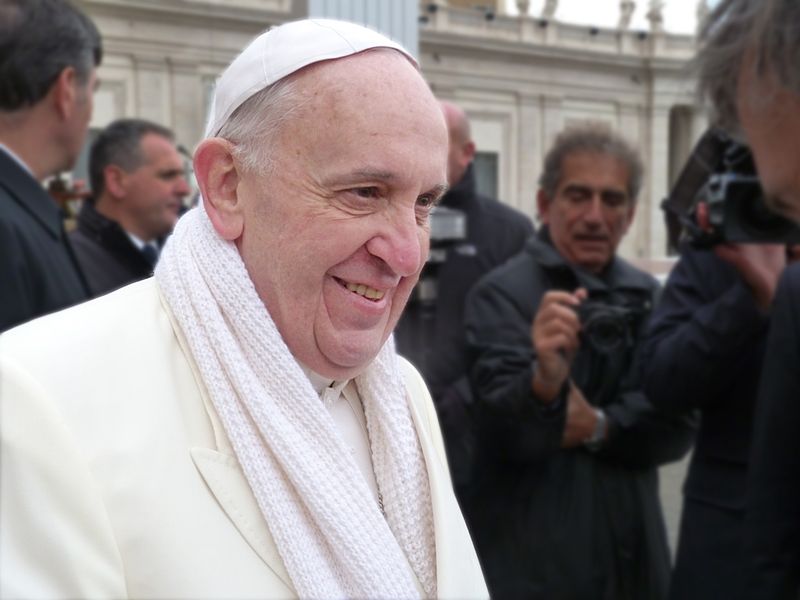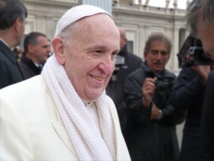This speech, which will be delivered by the leader of the Roman Catholic Church during the 6-day tour beginning on September 22, will no doubt be widely discussed in the media and in society.
78-year-old Pope Francis called the money "devil's dung" that enslaves people, and many expect from him shocking statements on politicians and businessmen in the country, which is considered a stronghold of capitalism.
- The Pope said that money are good, capital is good, but when money becomes a god, an idol, more important than people, then it is bad - regardless of what people on Wall Street think, - says Andrea Tornielli, author of "This economy kills", which describes the Pope's views on the economy.
The Pope will speak to members of Congress, the White House, the world leaders of the UN and millions of believers, with that, the Argentinian Pope is expected to make accusations against what he called the "globalization of indifference," especially about the wave of refugees from the Middle East.
There are 17 speeches and sermons planned. He will visit New York and Philadelphia, calling for the establishment of a new global economy and decisive action to combat climate change.
Francis, who called for a "poor church for the poor" after being elected pope in March 2013, will appeal to Spanish-speaking audiences, the homeless and prisoners.
His speech will be picked up by Bernie Sanders, who is the presidential candidate of the Democratic Party and opposes the "class of billionaires", and businessman Donald Trump, who is the leader in the Republican camp.
Ken Hackett, acting US ambassador to the Holy See, predicts that conservatives and liberals will "pick quotes, that fit their political agenda, from his speech," especially "at the beginning of their presidency".
He believes that the Pope will talk about the "excesses of capitalism," the problems of migration and climate change.
- I think he will call people in the Congress, in our country, to re-estimate and asses the values that made our nation great: hospitality, generosity and concern for those who left without attention,- said Hackett.
Economist Jeffrey Sachs said that Pope Francis believes that the markets "are destroying the common good".
According to the Pope, the markets are to blame for the fact that the climate is changing under the influence of humans, there are millions of people being traded illegally and hundreds of millions of people suffer. This was stated by Sachs, who works at the Pontifical Academy of Sciences and is a consultant to the Pope in the field of economy and ecology.
The Pope will call for ''a new approach to the global economy and society'' during a meeting with President Barack Obama, as well as during his speech in the US Congress and the United Nations.
- He is going to encourage people to ensure that they have overcome what he calls the "globalization of indifference" and help those who were thrown out of life, including the poor and migrants, - said Sachs, who is also a professor at Columbia University.
Pope criticized the "economic exclusion and inequality", stated that "this economy kills". He spoke of the ''right to control the state'' to impose borders of "absolute autonomy" for markets and financial speculations.
The candidate of the Republican Party, Jeb Bush, a Catholic, offended by these words, said: ''I do not ask for advice on economic policy from bishops, cardinals and the Pope". Some people even called the Pope Marxist.
However, this is not true. Francis is not a Marxist, he "acts against both free markets and communist collectivism," says Sachs.
Sachs added that the Pope "have learned a lot", among his advisers are many scientists, including Nobel Prize winners.
It's not about that Francis reads the writings on economics. "The pope is not a supporter of any economic school - says Tornielli. – He is inspired by what he has experienced, including the economic crisis in Argentina, as well as the social doctrine of the Church."
At the White House, President Obama and Francis, who arrives in the United States from Cuba, will speak about poverty and climate change, said Hackett. He also added that Francis supports the agreement on the Iranian nuclear program.
Regarding the different views on the question of birth control, abortion and gay marriage, Hackett said:
- There are differences. But I do not think there will be much attention paid to these issues on the vis-a-vis.
No matter to which contradictions will the Pope's visit lead - Hackett believes that this will be an unprecedented event, that would eclipse even the presidential inauguration.
source: bloomberg.com
78-year-old Pope Francis called the money "devil's dung" that enslaves people, and many expect from him shocking statements on politicians and businessmen in the country, which is considered a stronghold of capitalism.
- The Pope said that money are good, capital is good, but when money becomes a god, an idol, more important than people, then it is bad - regardless of what people on Wall Street think, - says Andrea Tornielli, author of "This economy kills", which describes the Pope's views on the economy.
The Pope will speak to members of Congress, the White House, the world leaders of the UN and millions of believers, with that, the Argentinian Pope is expected to make accusations against what he called the "globalization of indifference," especially about the wave of refugees from the Middle East.
There are 17 speeches and sermons planned. He will visit New York and Philadelphia, calling for the establishment of a new global economy and decisive action to combat climate change.
Francis, who called for a "poor church for the poor" after being elected pope in March 2013, will appeal to Spanish-speaking audiences, the homeless and prisoners.
His speech will be picked up by Bernie Sanders, who is the presidential candidate of the Democratic Party and opposes the "class of billionaires", and businessman Donald Trump, who is the leader in the Republican camp.
Ken Hackett, acting US ambassador to the Holy See, predicts that conservatives and liberals will "pick quotes, that fit their political agenda, from his speech," especially "at the beginning of their presidency".
He believes that the Pope will talk about the "excesses of capitalism," the problems of migration and climate change.
- I think he will call people in the Congress, in our country, to re-estimate and asses the values that made our nation great: hospitality, generosity and concern for those who left without attention,- said Hackett.
Economist Jeffrey Sachs said that Pope Francis believes that the markets "are destroying the common good".
According to the Pope, the markets are to blame for the fact that the climate is changing under the influence of humans, there are millions of people being traded illegally and hundreds of millions of people suffer. This was stated by Sachs, who works at the Pontifical Academy of Sciences and is a consultant to the Pope in the field of economy and ecology.
The Pope will call for ''a new approach to the global economy and society'' during a meeting with President Barack Obama, as well as during his speech in the US Congress and the United Nations.
- He is going to encourage people to ensure that they have overcome what he calls the "globalization of indifference" and help those who were thrown out of life, including the poor and migrants, - said Sachs, who is also a professor at Columbia University.
Pope criticized the "economic exclusion and inequality", stated that "this economy kills". He spoke of the ''right to control the state'' to impose borders of "absolute autonomy" for markets and financial speculations.
The candidate of the Republican Party, Jeb Bush, a Catholic, offended by these words, said: ''I do not ask for advice on economic policy from bishops, cardinals and the Pope". Some people even called the Pope Marxist.
However, this is not true. Francis is not a Marxist, he "acts against both free markets and communist collectivism," says Sachs.
Sachs added that the Pope "have learned a lot", among his advisers are many scientists, including Nobel Prize winners.
It's not about that Francis reads the writings on economics. "The pope is not a supporter of any economic school - says Tornielli. – He is inspired by what he has experienced, including the economic crisis in Argentina, as well as the social doctrine of the Church."
At the White House, President Obama and Francis, who arrives in the United States from Cuba, will speak about poverty and climate change, said Hackett. He also added that Francis supports the agreement on the Iranian nuclear program.
Regarding the different views on the question of birth control, abortion and gay marriage, Hackett said:
- There are differences. But I do not think there will be much attention paid to these issues on the vis-a-vis.
No matter to which contradictions will the Pope's visit lead - Hackett believes that this will be an unprecedented event, that would eclipse even the presidential inauguration.
source: bloomberg.com



















